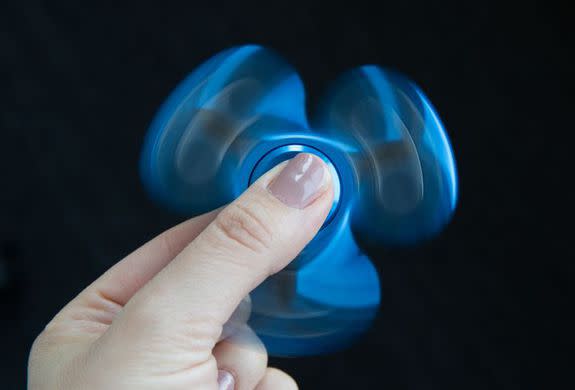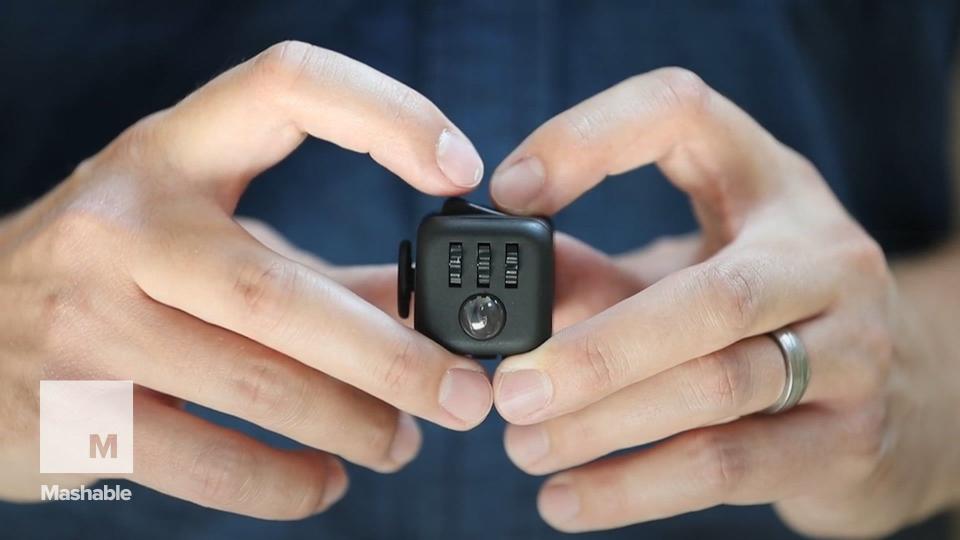What's a fidget spinner? A look at the gadget people can't stop talking about

We've all been there: filled with the insatiable need to click pens, twirl hair, or tap our fingers, just looking for a way to get more focused, soothe anxiety, or escape straight-up boredom. We've all needed to fidget.
Thanks to Florida-based inventor Catherine Hettinger — a really big thanks, because she hasn't made a cent from it — a unique, entertaining, palm-sized device is here to help people better manage their nervous energy. It's called the fidget spinner.
SEE ALSO: Channel all of your nervous energy into this Fidget Cube
The latest distraction tactic sweeping the globe is said to encourage focus and provide an outlet for people with autism, ADD, or ADHD. Sounds great, right? But there's one serious drawback. It's causing major controversy in schools.
What even is it?
The original fidget spinner is a three-pronged plastic device that uses ball bearings to enable motion and balance weight.
Holding the smooth, stationary center of the spinner between two fingers, users can flick the prongs, causing them to spin around in mesmerizing and methodic circular motions. Depending on the force applied, they'll move at different speeds. Once it takes off, I must admit, the spinner provides a certain sense of comfort just whirring around in your hand.

Image: lili sams/mashable
Though the spinners share a common functionality they vary in design. Those that have a raised middle structure can easily be balanced atop fingertips while spinning.
Doesn't this seem familiar?
Well, yes. Hettinger created the invention more than two decades ago, hoping to entertain her 7-year-old daughter. Since then we've seen a plethora of fidget-friendly devices looking to help those who benefit from engaging in repetitive action.
A similar concentration toy, the Fidget Cube, became an all-the-rage desk companion when it was crowdfunded in 2016 by Antsy Labs. The device featured moveable gears and clickable buttons, and was handheld, so, like the spinner, it could be easily hidden.
Because the act of fidgeting is often looked down upon, in 2016 Didget Babes — a design duo with a line of stimulating devices — set out to make fidgeting "sexier" by funding a Kickstarter for three unique, more visually appealing products: the Rollers, the Cubix, and the Squishy.
Where can I get mine?
Tons of places! Though common department stores like Walmart sell a selection of the devices, you can also purchase a classic spinner online through Amazon or Etsy for around $5 to $20. And if you’re looking for a more high-end, psychedelic selection of designs, check this out.

Image: screengrab/walmart
What's with all the controversy?
Despite the fact that fidgeting has been proven helpful for people with ADD, ADHD, and autism — who derive increased concentration from double-tasking — as well as people who suffer from stress or anxiety, schools in the United States and UK are banning children from using fidget spinners in the classroom.
The Chicago Tribune goes so far as to label the pocket-sized toys a "threat to America," claiming the incessant spinning serves as a distraction that does more harm than good. While that seems a tad dramatic, some teachers agree.
"In a group setting, they don't always make sense," Rebecca Sachs PHD ABPP, who owns a CBT Spectrum therapy practice in Manhattan, told the New York Daily News. "These fidget spinners make noise and can be visually disruptive to other students."
A private school teacher from Elmhurst, Queens, told the publication that while there are benefits for some, other children are simply "using them as a game to see who can balance them longer or spin them faster."
Some schools have decided to fully ban the devices, treating them as they would any old toy; others are trying to limit usage to those who truly need it. "I have a student with documented ADHD who had to get a letter from her neurologist just to be able to use her fidget spinner in school," the teacher said.
Distracting or not, there are some solid arguments on both sides. We'll keep spinning as we watch this whole thing play out.
WATCH: Check out the cube fidgeters everywhere are obsessed with


 Yahoo News
Yahoo News 
